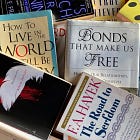How to Repurpose Your Discomfort
We first decide to “obliterate the present” and then we select the tool to accomplish our goal.
In his book Awake, Dr. Angelo Dilullo wrote, “We as humans can and do go to amazing lengths to avoid discomfort… We live in a society of endless distractions and any of these can be used to avoid discomfort.”
In a recent essay, I explored an observation of the 17th-century French mathematician and philosopher Blaise Pascal. He wrote, “I have often said that the sole cause of man’s unhappiness is that he does not know how to stay quietly in his room.” Pascal argued that humans crave distractions, like power and pleasure, because they struggle with solitude.
Pascal's insight may leave you puzzled. If you think you are exempt from the struggle with quiet, try this exercise: Sit in a chair for 15 minutes alone without a book, electronic gadget, or any means of “diversion.” You'll immediately understand why people always grab their phones, food, and more. I often assigned this exercise to my MBA leadership students. Some of my students reported it was nearly impossible to complete it. The stream of thoughts that came to them aroused great anxiety in the absence of distractions.
Gabor Maté observed, “Work pressures, multitasking, social media, news updates, multiplicities of entertainment sources—these all induce us to become lost in thoughts, frantic activities, gadgets, meaningless conversations. We are caught up in pursuits of all kinds that draw us on not because they are necessary or inspiring or uplifting, or because they enrich or add meaning to our lives, but simply because they obliterate the present.”
Maté has partially reversed cause and effect. We first make the decision to “obliterate the present” and then we select the tool to accomplish our goal. Social media and smartphones appear to be the culprit, but as Pascal observed, distractions simply mirror our innate desire for a mental escape.
You may know the Outward Bound saying, “If you can’t get out of it, get into it.”
What a relief! It's completely normal to feel uneasy. Getting rid of discomfort is not an achievable goal. Nor is it wise to wallow in discomfort. What we can do is repurpose our discomfort as it arises.
Marcus Aurelius made this a practice: “At the start of the day tell yourself: I shall meet people who are officious, ungrateful, abusive, treacherous, malicious, and selfish.”
Marcus didn’t proclaim, Now that I am an old man and have practiced disciplining my mind for so many years, I no longer experience annoyance, anxiety, and anger.
Our sessions at Mindset Shifts U can help you dive deep into Marcus's Meditations.
With practice, the influence discomfort has on our behavior and choices can diminish, but the ego's loud demands can quickly regain control.
We can acknowledge our discomfort rather than ignore it or explain it with spiritual sayings.
What if our discomfort is a portal to what lies beyond our endless stream of anxious and fearful thoughts?
With a little willingness, Pascal's insight points to a valuable practice that can help us.





